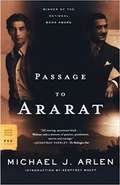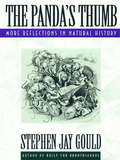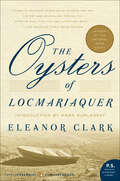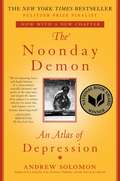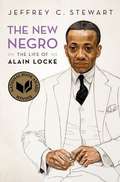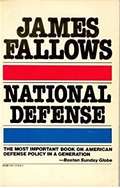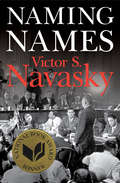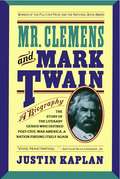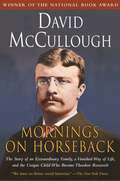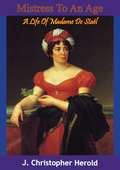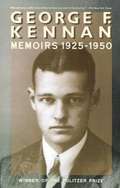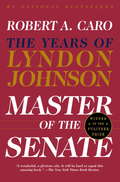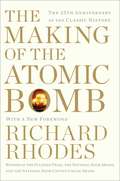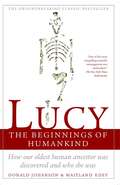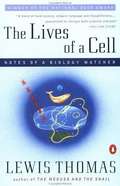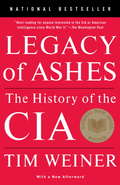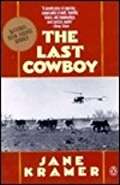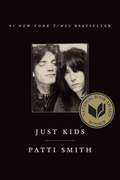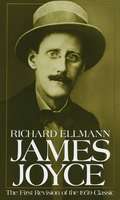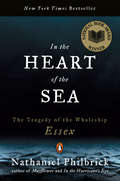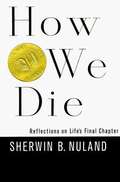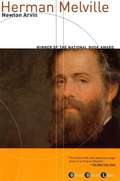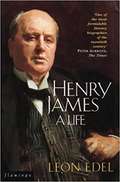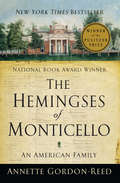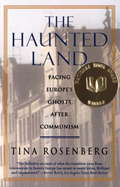Special Collections
National Book Award Winners - Non-Fiction
- Table View
- List View
Passage to Ararat
by Michael J. ArlenIn Passage to Ararat, Michael J. Arlen goes beyond the portrait of his father, the famous Anglo-Armenian novelist of the 1920s, that he created in Exiles to try to discover what his father had tried to forget: Armenia and what it meant to be an Armenian, a descendant of a proud people whom conquerors had for centuries tried to exterminate. But perhaps most affectingly, Arlen tells a story as large as a whole people yet as personal as the uneasy bond between a father and a son, offering a masterful account of the affirmation and pain of kinship.
Winner of the National Book Award
The Panda's Thumb
by Stephen Jay GouldWere dinosaurs really dumber than lizards? Why, after ?all, are roughly the same number of men and women born into the world? What led the famous Dr. Down to his theory of mongolism, and its racist residue? What do the panda's magical "thumb" and the sea turtle's perilous migration tell us about imperfections that prove the evolutionary rule? The wonders and mysteries of evolutionary biology are elegantly explored in these and other essays by the celebrated natural history writer Stephen Jay Gould.
Winner of the National Book Award
The Oysters of Locmariaquer
by Eleanor ClarkWinner of the National Book Award“What an elegant book this is, starting with that most elegant of creatures, the Belon oyster. . . . [Clark’s] fantastic blending of science and art, history and journalism, brings the appetite back for life and literature both.” — Los Angeles Times Book ReviewOn the northwest coast of France, just around the corner from the English Channel, is the little town of Locmariaquer (pronounced "loc-maria-care"). The inhabitants of this town have a special relationship to the world, for it is their efforts that maintain the supply of the famous Belon oysters, called les plates ("the flat ones"). A vivid account of the cultivation of Belon oysters and an excursion into the myths, legends, and rich, vibrant history of Brittany and its extraordinary people, The Oysters of Locmariaquer is also an unforgettable journey to the heart of a fascinating culture and the enthralling, accumulating drama of a unique devotion.
The Noonday Demon
by Andrew SolomonWith uncommon humanity, candor, wit, and erudition, award-winning author Andrew Solomon takes the reader on a journey of incomparable range and resonance into the most pervasive of family secrets. His contribution to our understanding not only of mental illness but also of the human condition is truly stunning.
The Noonday Demon examines depression in personal, cultural, and scientific terms. Drawing on his own struggles with the illness and interviews with fellow sufferers, doctors and scientists, policymakers and politicians, drug designers and philosophers, Solomon reveals the subtle complexities and sheer agony of the disease. He confronts the challenge of defining the illness and describes the vast range of available medications, the efficacy of alternative treatments, and the impact the malady has had on various demographic populations around the world and throughout history. He also explores the thorny patch of moral and ethical questions posed by emerging biological explanations for mental illness.
The depth of human experience Solomon chronicles, the range of his intelligence, and his boundless curiosity and compassion will change the reader's view of the world.
The New Negro
by Jeffrey C. StewartWinner of the 2018 National Book Award for Nonfiction.
A tiny, fastidiously dressed man emerged from Black Philadelphia around the turn of the century to mentor a generation of young artists including Langston Hughes, Zora Neale Hurston, and Jacob Lawrence and call them the New Negro -- the creative African Americans whose art, literature, music, and drama would inspire Black people to greatness.
In The New Negro: The Life of Alain Locke, Jeffrey C. Stewart offers the definitive biography of the father of the Harlem Renaissance, based on the extant primary sources of his life and on interviews with those who knew him personally. He narrates the education of Locke, including his becoming the first African American Rhodes Scholar and earning a PhD in philosophy at Harvard University, and his long career as a professor at Howard University. Locke also received a cosmopolitan, aesthetic education through his travels in continental Europe, where he came to appreciate the beauty of art and experienced a freedom unknown to him in the United States. And yet he became most closely associated with the flowering of Black culture in Jazz Age America and his promotion of the literary and artistic work of African Americans as the quintessential creations of American modernism. In the process he looked to Africa to find the proud and beautiful roots of the race. Shifting the discussion of race from politics and economics to the arts, he helped establish the idea that Black urban communities could be crucibles of creativity. Stewart explores both Locke's professional and private life, including his relationships with his mother, his friends, and his white patrons, as well as his lifelong search for love as a gay man.
Stewart's thought-provoking biography recreates the worlds of this illustrious, enigmatic man who, in promoting the cultural heritage of Black people, became -- in the process -- a New Negro himself.
National Defense
by James FallowsTHIS BOOK is designed to give the general reader better ways of thinking about defense. In the first few years of the 1980s, the United States will have to make choices of enormous consequence about the size, purpose, and composition of its military force. These include whether to restore the draft, build new nuclear missiles and bombers, enlarge the Navy, equip a "rapid deployment force" for intervention overseas.
Winner of the National Book Award
Naming Names
by Victor S. NavaskyWinner of the National Book Award: The definitive history of Joe McCarthy, the Hollywood blacklist, and HUAC explores the events behind the hit film Trumbo. Drawing on interviews with over one hundred and fifty people who were called to testify before the House Un-American Activities Committee—including Elia Kazan, Ring Lardner Jr., and Arthur Miller—award-winning author Victor S. Navasky reveals how and why the blacklists were so effective and delves into the tragic and far-reaching consequences of Joseph McCarthy&’s witch hunts. A compassionate, insightful, and even-handed examination of one of our country&’s darkest hours, Naming Names is at once a morality play and a fascinating window onto a searing moment in American cultural and political history.
Mr. Clemens and Mark Twain
by Justin KaplanMark Twain, the American comic genius who portrayed, named, and in part exemplified America's "Gilded Age," comes alive -- a presence felt, an artist understood -- in Justin Kaplan's extraordinary biography.
With brilliant immediacy, Mr. Clemens and Mark Twain brings to life a towering literary figure whose dual persona symbolized the emerging American conflict between down-to-earth morality and freewheeling ambition. As Mark Twain, he was the Mississippi riverboat pilot, the satirist with a fiery hatred of pretension, and the author of such classics as Tom Sawyer and Huckleberry Finn. As Mr. Clemens, he was the star who married an heiress, built a palatial estate, threw away fortunes on harebrained financial schemes, and lived the extravagant life that Mark Twain despised. Kaplan effectively portrays the triumphant-tragic man whose achievements and failures, laughter and anger, reflect a crucial generation in our past as well as his own dark, divided, and remarkably contemporary spirit.
The book begins as the thirty-one-year-old Mark Twain, carrying bottled within himself the experience of his boyhood in Hannibal and his coming-of-age on the Mississippi and on Nevada's silver-rush frontier, quits San Francisco and the old elemental America of the open spaces. He is heading east for the burgeoning new urban America of commerce, invention, finance, and status, where he is destined to marry well, hobnob with the rich and influential, throw away fortunes on tragically alluring schemes...and produce literary works that fulfill and go beyond the vocation he has already acknowledged: "to excite the laughter of God's creatures." He is heard, seen, made palpable. The texture of his marriage with Olivia Langdon, the protean presence of Mark Twain on the lecture platform, his friendships and enmities -- virtually all his closest relationships partook of both -- spring to life. His writing and publishing experience is organically re-created. His endurance in the face of personal tragedy, his unrivaled charm, his compulsion to quarrel, his humility and his vanity are evoked and felt. His wit rings through the book. "Honest poverty is a gem that even a King might be proud to call his own, but I wish to sell out. I have sported that kind of jewelry long enough." Thus the young Mark Twain, on the eve of world fame, spoke his disgust at a money-centered society in that blatantly philistine voice that he chose for his most savage satirical declarations. But all his life -- racked by his own ambivalences -- he was to embrace the values of that society. Mr. Clemens and Mark Twain brilliantly conveys this towering literary figure who was himself a symbol of the peculiarly American conflict between moral scrutiny and the drive to succeed. Mr. Clemens lived the Gilded Life that Mark Twain despised. The merging and fragmenting of these and other identities, as the biography unfolds, results in a magnificent projection of the whole man; the great comic spirit; and the exuberant, tragic human being, who, his friend William Dean Howells said, was "sole, incomparable, the Lincoln of our literature."
Winner of the National Book Award
Pulitzer Prize Winner
Mornings on Horseback
by David McculloughThe National Book Award-winning biography that tells the story of how young Teddy Roosevelt transformed himself from a sickly boy into the vigorous man who would become a war hero and ultimately president of the United States, told by master historian David McCullough.Mornings on Horseback is the brilliant biography of the young Theodore Roosevelt. Hailed as "a masterpiece" (John A. Gable, Newsday), it is the winner of the Los Angeles Times 1981 Book Prize for Biography and the National Book Award for Biography.
Written by David McCullough, the author of Truman, this is the story of a remarkable little boy, seriously handicapped by recurrent and almost fatal asthma attacks, and his struggle to manhood: an amazing metamorphosis seen in the context of the very uncommon household in which he was raised. The father is the first Theodore Roosevelt, a figure of unbounded energy, enormously attractive and selfless, a god in the eyes of his small, frail namesake.
The mother, Mittie Bulloch Roosevelt, is a Southerner and a celebrated beauty, but also considerably more, which the book makes clear as never before. There are sisters Anna and Corinne, brother Elliott (who becomes the father of Eleanor Roosevelt), and the lovely, tragic Alice Lee, TR's first love. All are brought to life to make "a beautifully told story, filled with fresh detail" (The New York Times Book Review). A book to be read on many levels, it is at once an enthralling story, a brilliant social history and a work of important scholarship which does away with several old myths and breaks entirely new ground. It is a book about life intensely lived, about family love and loyalty, about grief and courage, about "blessed" mornings on horseback beneath the wide blue skies of the Badlands scholarship, which does away with several old myths and breaks entirely new ground.
For the first time, for example, Roosevelt's asthma is examined closely, drawing on information gleaned from private Roosevelt family papers and in light of present-day knowledge of the disease and its psychosomatic aspects. At heart it is a book about life intensely lived...about family love and family loyalty...about courtship and childbirth and death, fathers and sons...about winter on the Nile in the grand manner and Harvard College...about gutter politics in washrooms and the tumultuous Republican Convention of 1884...about grizzly bears, grief and courage, and "blessed" mornings on horseback at Oyster Bay or beneath the limitless skies of the Badlands. "Black care rarely sits behind a rider whose pace is fast enough," Roosevelt once wrote. It is the key to his life and to much that is so memorable in this magnificent book.
Mistress To An Age
by J. Christopher HeroldJ. Christopher Herold vigorously tells the story of the fierce Madame de Stael, revealing her courageous opposition to Napoleon, her whirlwind affairs with the great intellectuals of her day, and her idealistic rebellion against all that was cynical, tyrannical, and passionless. Germaine de Stael's father was Jacques Necker, the finance minister to Louis XVI, and her mother ran an influential literary-political salon in Paris. Always precocious, at nineteen Germaine married the Swedish ambassador to France, Eric Magnus Baron de Stael-Holstein, and in 1785 took over her mother's salon with great success. Germaine and de Stael lived most of their married life apart. She had many brilliant lovers. Talleyrand was the first, Narbonne, the minister of war, another; Benjamin Constant was her most significant and long-lasting one. She published several political and literary essays, including "A Treatise on the Influence of the Passions upon the Happiness of Individuals and of Nations, " which became oneof the most important documents of European Romanticism. Her bold philosophical ideas, particularly those in "On Literature, " caused feverish commotion in France and were quickly noticed by Napoleon, who saw her salon as a rallying point for the opposition. He eventually exiled her from France.
Winner of the 1959 National Book Award
Memoirs (1925-1950)
by George F. KennanThe American diplomat's reflections of his years of government service provide insight into four decades of U.S. policy
Winner of the National Book Award
Pulitzer Prize Winner
Master of the Senate
by Robert A. CaroThe most riveting political biography of our time, Robert A. Caro's life of Lyndon B. Johnson, continues. Master of the Senate takes Johnson's story through one of its most remarkable periods: his twelve years, from 1949 through 1960, in the United States Senate. Once the most august and revered body in politics, by the time Johnson arrived the Senate had become a parody of itself and an obstacle that for decades had blocked desperately needed liberal legislation. Caro shows how Johnson's brilliance, charm, and ruthlessness enabled him to become the youngest and most powerful Majority Leader in history and how he used his incomparable legislative genius--seducing both Northern liberals and Southern conservatives--to pass the first Civil Rights legislation since Reconstruction. Brilliantly weaving rich detail into a gripping narrative, Caro gives us both a galvanizing portrait of Johnson himself and a definitive and revelatory study of the workings of legislative power.
Winner of the National Book Award
Winner of the Pulitzer Prize
Making of the Atomic Bomb
by Richard RhodesTwenty-five years after its initial publication, The Making of the Atomic Bomb remains the definitive history of nuclear weapons and the Manhattan Project. From the turn-of-the-century discovery of nuclear energy to the dropping of the first bombs on Japan, Richard Rhodes’s Pulitzer Prize-winning book details the science, the people, and the socio-political realities that led to the development of the atomic bomb.
This sweeping account begins in the 19th century, with the discovery of nuclear fission, and continues to World War Two and the Americans’ race to beat Hitler’s Nazis. That competition launched the Manhattan Project and the nearly overnight construction of a vast military-industrial complex that culminated in the fateful dropping of the first bombs on Hiroshima and Nagasaki.
Reading like a character-driven suspense novel, the book introduces the players in this saga of physics, politics, and human psychology—from FDR and Einstein to the visionary scientists who pioneered quantum theory and the application of thermonuclear fission, including Planck, Szilard, Bohr, Oppenheimer, Fermi, Teller, Meitner, von Neumann, and Lawrence.
From nuclear power’s earliest foreshadowing in the work of H.G. Wells to the bright glare of Trinity at Alamogordo and the arms race of the Cold War, this dread invention forever changed the course of human history, and The Making of The Atomic Bomb provides a panoramic backdrop for that story.
Richard Rhodes’s ability to craft compelling biographical portraits is matched only by his rigorous scholarship. Told in rich human, political, and scientific detail that any reader can follow, The Making of the Atomic Bomb is a thought-provoking and masterful work.
Winner of the Pulitzer Prize.
Winner of the National Book Award
Lucy
by Maitland A. Edey and Donald C. JohansenThe dramatic discovery of our oldest human ancestor and the controversial change it makes in our view of human origins
Winner of the National Book Award
Lives of a Cell
by Lewis ThomasElegant, suggestive, and clarifying, Lewis Thomas's profoundly humane vision explores the world around us and examines the complex interdependence of all things. Extending beyond the usual limitations of biological science and into a vast and wondrous world of hidden relationships, this provocative book explores in personal, poetic essays to topics such as computers, germs, language, music, death, insects, and medicine. Lewis Thomas writes, "Once you have become permanently startled, as I am, by the realization that we are a social species, you tend to keep an eye out for the pieces of evidence that this is, by and large, good for us."
Winner of the National Book Award
Legacy of Ashes
by Tim WeinerWith shocking revelations that made headlines in papers across the country, Pulitzer-Prize-winner Tim Weiner gets at the truth behind the CIA and uncovers here why nearly every CIA Director has left the agency in worse shape than when he found it; and how these profound failures jeopardize our national security.
The Last Cowboy
by Jane KramerPortrays the life of a man who strives to be "a proper cowboy" despite radical changes which have propelled the Old West into a New Southwest characterized by industrialized agribusiness.
'The West that Henry mourned belonged to the Western movie, where the land and the cattle went to their proper guardians and brought a fortune in respect and power. It was a West where the best cowboy got to shoot the meanest outlaw, woo the prettiest schoolteacher, bed her briefly to produce sons, and then ignore her for the finer company of other cowboys - a West as sentimental and as brutal as the people who made a virtue of that curious combination of qualities and called it the American experience.' From the Introduction: Henry Blanton is the 'last cowboy' of Jane Kramer's classic portrait, the failed hero of his own mythology, the man who ends an era for himself. His story - his flawed, funny, and in the end tragic efforts to be a proper cowboy, 'expressin' right' in a world where the range is a feed yard and college boys run ranches from air-conditioned Buicks -is the story of a country coming of age in great promise and greater disappointment. A hundred and fifty miles up the highway from agri-business Amarillo, Henry claimed the extravagant prerogatives of a free man on a horse. He rode his own frontier, decked out in his vigilance and his honour, until the shocking moment when in the person of Henry Blanton the West and the Western had a showdown.
Winner of the National Book Award
Just Kids
by Patti SmithPatti Smith would evolve as a poet and performer, and Robert Mapplethorpe would direct his highly provocative style toward photography. Bound in innocence and enthusiasm, they traversed the city from Coney Island to Forty-second Street, and eventually to the celebrated round table of Max's Kansas City, where the Andy Warhol contingent held court. In 1969, the pair set up camp at the Hotel Chelsea and soon entered a community of the famous and infamous- the influential artists of the day and the colorful fringe. It was a time of heightened awareness, when the worlds of poetry, rock and roll, art, and sexual politics were colliding and exploding. In this milieu, two kids made a pact to take care of each other. Scrappy, romantic, committed to create, and fueled by their mutual dreams and drives, they would prod and provide for one another during the hungry years. Just Kids begins as a love story and ends as an elegy. It serves as a salute to New York City during the late sixties and seventies and to its rich and poor, its hustlers and hellions. A true fable, it is a portrait of two young artists' ascent, a prelude to fame.
Winner of the National Book Award
James Joyce
by Richard EllmannBiography of the Irish author. Listed #73 on Modern Library's top 100 nonfiction books of the century.
Winner of the National Book Award
In the Heart of the Sea
by Nathaniel Philbrick"With its huge, scarred head halfway out of the water and its tail beating the ocean into a white-water wake more than forty feet across, the whale approached the ship at twice its original speed--at least six knots. With a tremendous cracking and splintering of oak, it struck the ship just beneath the anchor secured at the cat-head on the port bow..."
In the Heart of the Sea brings to new life the incredible story of the wreck of the whaleship Essex--an event as mythic in its own century as the Titanic disaster in ours, and the inspiration for the climax of Moby-Dick. In a harrowing page-turner, Nathaniel Philbrick restores this epic story to its rightful place in American history.
In 1820, the 240-ton Essex set sail from Nantucket on a routine voyage for whales. Fifteen months later, in the farthest reaches of the South Pacific, it was repeatedly rammed and sunk by an eighty-ton bull sperm whale. Its twenty-man crew, fearing cannibals on the islands to the west, made for the 3,000-mile-distant coast of South America in three tiny boats. During ninety days at sea under horrendous conditions, the survivors clung to life as one by one, they succumbed to hunger, thirst, disease, and fear.
In the Heart of the Sea tells perhaps the greatest sea story ever. Philbrick interweaves his account of this extraordinary ordeal of ordinary men with a wealth of whale lore and with a brilliantly detailed portrait of the lost, unique community of Nantucket whalers. Impeccably researched and beautifully told, the book delivers the ultimate portrait of man against nature, drawing on a remarkable range of archival and modern sources, including a long-lost account by the ship's cabin boy. At once a literary companion and a page-turner that speaks to the same issues of class, race, and man's relationship to nature that permeate the works of Melville, In the Heart of the Sea will endure as a vital work of American history.
Winner of the National Book Award
How We Die
by Sherwin B. NulandAttempting to demythologize the process of dying, Nuland explores how we shall die, each of us in a way that will be unique. Through particular stories of dying--of patients, and of his own family--he examines the seven most common roads to death: old age, cancer, AIDS, Alzheimer's, accidents, heart disease, and strokes, revealing the facets of death's multiplicity. "It's impossible to read How We Die without realizing how earnestly we have avoided this most unavoidable of subjects, how we have protected ourselves by building a cultural wall of myths and lies. I don't know of any writer or scientist who has shown us the face of death as clearly, honestly and compassionately as Sherwin Nuland does here."--James Gleick.
*** Originally published in 1994 and on the New York Times bestseller list for weeks, this reprint includes an in-depth 2010 post-epilogue epilogue by the author.
Winner of the National Book Award
Herman Melville
by Newton ArvinOne of America's most enigmatic literary figures, Herman Melville lived a life full of adventure, hardship, and moral conflict. Known for his nautical escapades, Melville first went to sea in his early twenties, sailing to England and then Polynesia where he found himself fleeing from cannibals, joining a mutiny, and frolicking with naked islanders. His novels were, for the most part, unsuccessful and misunderstood, and later in life he had to accept work as a low-level customs agent to support his wife and children. His only close friend was Nathaniel Hawthorne to whom he dedicated Moby-Dick. Newton Arvin's biography captures the troubled, often reclusive man whose major works include Typee, Omoo, Bartleby the Scrivener, Billy Budd, and his indisputable masterpiece, Moby-Dick.
Winner of the National Book Award
Henry James
by Leon EdelThis is the one-volume edition of a famous biography of Henry James. Born in America, Henry James was educated both there and in Europe before settling in London, where he was to spend most of his life, in 1876. His novels represent the culmination of the 19th-century realist tradition of Austen, George Eliot, Flauberty and Balzac, and a decisive step towards the experimental modernism of Woolf and T.S. Eliot. His works often focus upon an innocent American in Europe, and assess the qualities and dangers of both American and European culture at the time, as well as showing their vast differences. "A Portrait of a Lady", "The Ambassadors" and "The Golden Bowl" all explore this subject, whilst Honore de Balzac's "Eugenie Grandet" was so admired by James that he was inspired to write "Washington Square", his own version of the tale. James's works explore sexual roles, feminism and class conflict.
Winner of the National Book Award
Pulitzer Prize Winner
The Hemingses of Monticello
by Annette Gordon-ReedWinner of the National Book Award and the Pulitzer Prize
This epic work tells the story of the Hemingses, whose close blood ties to our third president had been systematically expunged from American history until very recently. Now, historian and legal scholar Annette Gordon-Reed traces the Hemings family from its origins in Virginia in the 1700s to the family's dispersal after Jefferson's death in 1826.
The Haunted Land
by Tina RosenbergThe Haunted Land is a look at how four newly democratic eastern European nations are dealing with the memories of forty years of communism. As one official orthodoxy replaces another, the people and governments of Germany, Poland, the Czech Republic, and Slovakia face ethical dilemmas as complex and wrenching as anything out of Kafka or Orwell. In the greatest moral drama of our time, Communist totalitarianism drew well-intentioned, even idealistic people into horrible crimes. Now, as formerly Communist nations attempt to atone for the past, there is the everpresent temptation to rewrite history to suit the demands of the present. Tina Rosenberg s journalistic triumph is to put a human face on the abstractions of intrigue and betrayal, memory and ideology. The stories in this book take place not just in the highest councils of government and courts of law, but also in smoky pubs and the most private chambers of the soul. The Haunted Land shows how people struggle with their own definitions of guilt as they learn their betrayers were their husbands, fathers, and best friends.
Winner of the Pulitzer Prize.
Winner of the National Book Award
